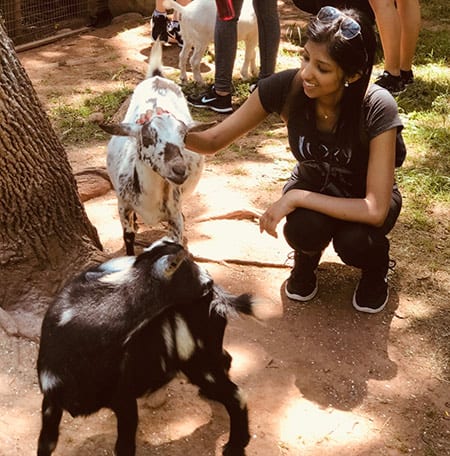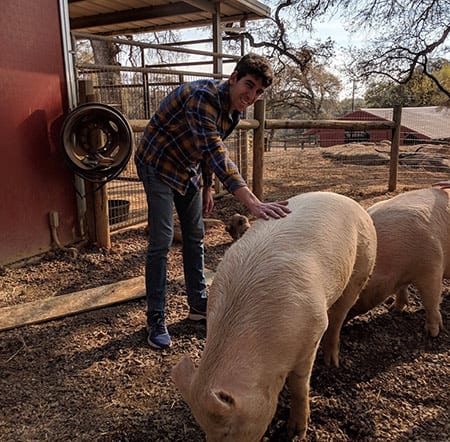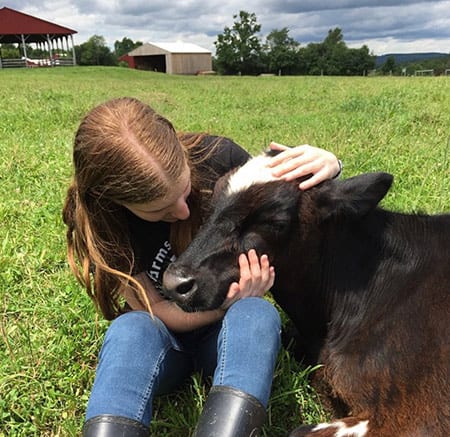By Gwyneth K. Shaw

When Nikita Yogeshwarun ’20 was in high school, a teacher challenged her use of a s/he pronoun in an essay on endangered species in circuses. An animal, the teacher said, should be an “it.”
“Our rhetorical structures—from grammar to idioms—literally objectify non-human animals,” Yogeshwarun says. “My act of lingual resistance was seen as ‘radical.’’’
The desire to push back at that thinking is part of what led her to Berkeley Law. And it informed her work with a group of fellow students to create the Animal Law and Advocacy Project, one of the school’s newest pro bono Student-Initiated Legal Services Projects (SLPS).
“California has given rise to some of the strongest animal protection legislation in the nation, and there’s a strong network of activists in the Bay Area,” she says. “During my time at Berkeley Law, I’ve already seen historic measures pass like the California fur ban and Proposition 12, which currently offers the highest standards of care for factory-farmed animals in the U.S., although even those standards are still inhumane.”
While Yogeshwarun was president of the school’s Animal Law Society, which promotes moving toward a plant-based diet, the group hosted lawyers who work on a broad range of animal law issues. She encountered students who were interested in animal rights but did not realize that a legal field existed to address these topics.
“It was exciting to see the number of students who wanted to commit their pro bono efforts to this cause,” she says.
Student enterprise
Since coming to Berkeley, Yogeshwarun had been working with a number of local animal-rights organizations, including the Animal Legal Defense Fund (ALDF), Mercy for Animals, the Center for Biological Diversity, and Direct Action Everywhere. She started referring interested students directly to one of those groups.

Berkeley Law Pro Bono Program Director Deborah Schlosberg noticed the amount of interest in the topic. Together, she and Yogeshwarun established the project, with ALDF lawyer Chris Berry serving as the supervising attorney.
There are currently eight students involved, with Yogeshwarun, Ben Stollman ’21, and Sarah Gold ’21 as the student leaders.
Open to all Berkeley Law students, SLPS are community-based, pro bono projects where students can do client service, legal research, outreach, and organizing as early as their first semester. There are 35 active SLPS.
“The Animal Law Advocacy Project arose because we have passionate and committed students who wanted to pursue pro bono work advocating for animal rights and engage their classmates in joining their efforts,” Schlosberg says. “Once Chris Berry agreed to serve as the supervising attorney, we knew that the students could engage in meaningful and impactful work on behalf of a leading legal services organization in the field. Our students are now doing work they care deeply about while developing their legal research and writing skills.”
Stollman says he was drawn to the project as a way to fill a gap for students interested in the topic, since Berkeley Law offers an animal law class every two years.
“I came to law school for many reasons, but my desire to help others through the law was my biggest motivating factor,” he explains. “While I never thought that I’d be an advocate solely for animals, I think my experiences through this SLP and through my involvement with the Animal Law Society will influence the types of pro bono opportunities I seek out in the future.”
The project aims to advance the interests of animals through the legal system. One obvious channel is administrative law, given that many federal agencies—including the U.S. Departments of Agriculture (USDA), Interior, and Health and Human Services—all have policies affecting animals, from meat processing to wildlife management.
Diving in
A main focus for the first year will be the USDA Animal and Plant Health Inspection Service’s “fine and dash” practice. Under this practice, the agency imposes penalties or revokes the licenses of facilities that are not in compliance with the Animal Welfare Act—but doesn’t address what to do with the animals left at these defunct facilities. Students will investigate the topic and potential use of administrative law to ask the USDA to address the problem.

Ultimately, the project will go far beyond that issue. “Animal law is so intersectional,” Yogeshwarun says, noting that it touches on fields like international law and consumer protection as well as more well-known areas.
There are constitutional questions, such as when “ag-gag” laws try to stop whistleblowers from revealing what happens behind the scenes at large farms. Environmental law issues abound, including the fate of animals as the client changes, the impact of pollution on animals, and what happens to the Endangered Species Act.
“This project is a great opportunity for law students to learn, build practical skills, and have a meaningful impact on the world,” says Berry, whose work with the ALDF has spanned a wide range of areas, from puppy mills to crafting new theories in animal law.
For Yogeshwarun, the new project exemplifies why Berkeley Law has been a great fit as she builds a career challenging norms.
“Social justice is interwoven into the fabric of Berkeley, a place that continually challenges the roots of oppression … as a moral leader for the most vulnerable and marginalized,” she says. “I believe the institution recognizes that our community cannot be selective about suffering. The Animal Law and Advocacy Project further symbolizes these efforts.”
Photos courtesy of Nikita Yogeshwarun.